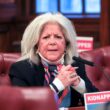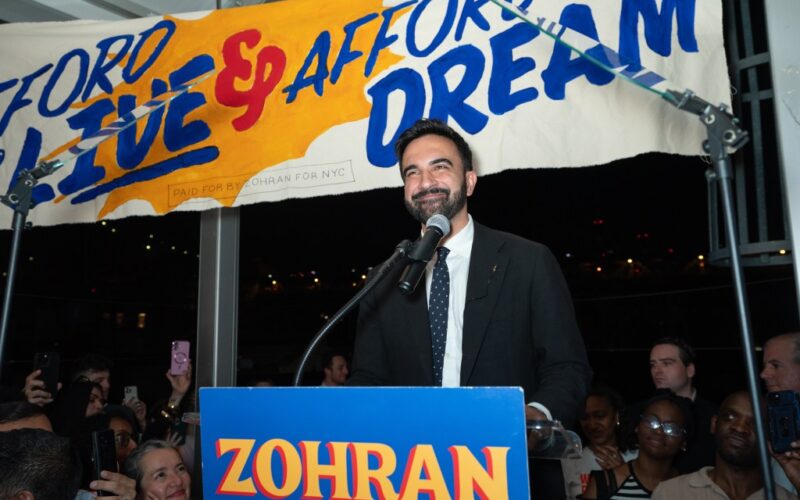This month, the New York Working Families Party held a convening following its incredible successes in primaries around New York State. Together, Attorney General Tish James and WFP mayoral nominees rallied the leaders, affiliates, and volunteers who made it possible.
At a time when institutions are bending the knee to Donald Trump and the Democratic Party is paralyzed, the WFP is building capacity, strategically leveraging power, and engaging voters in cities big and small. Nowhere was this clearer than in Zohran Mamdani’s landmark win in the Democratic primary for New York City mayor.
A critical factor in victory — along with the incredible field operation powered by the Democratic Socialists of America — was the WFP’s role in organizing the progressive political ecosystem to work strategically and leverage the full power of Ranked Choice Voting.
When Andrew Cuomo announced his run, he was close to 50%. Many declared the race effectively over. But the WFP developed a theory: to defeat the billionaires’ candidate, we needed an ideologically unified, racially diverse slate representing working families.
The WFP organized its affiliates around its two-step endorsement process strategy — first selecting a slate of candidates, then ranking the slate closer to Primary Day. This allowed political actors in the left ecosystem to hold progressives united by supporting candidates who would collaborate instead of attacking each other, preventing the fragmentation that characterized the 2021 election.
Ahead of the slate selection, the WFP held regular meetings with mayoral candidates, presenting data, building trust, and assessing commitment to collaboration. The slate announcement in March built a line around candidates with a vision to make the city more affordable, the courage to stand up to Trump, and the commitment to collaborate to defeat the billionaires’ candidate.
We recognized our leverage: where Cuomo had endless money and decades of relationships with power-brokers, our advantage was our ability to hold the anti-Cuomo coalition together.
This reshaped the race’s dynamics: the slate as a “team of rivals” versus Cuomo, fearmongering while siding with the wealthy. The WFP’s two-step process incentivized candidates to stay aligned while finding ways to stand out.
Defining the opposition was equally important. On the day Cuomo launched his campaign, the WFP organized an action centering survivors’ voices, reminding voters of Cuomo’s corruption and abuses of power. Rather than attacking each other, slate candidates echoed similar messaging about Cuomo’s disgraceful record.
When more New Yorkers were tuning in, we announced our rankings. Zohran was ahead in polls, but to catch Cuomo, he needed to consolidate support and gain validation. WFP’s ranking of Zohran as #1 was crucial, quickly followed by endorsements from AOC and Nydia Velázquez, Tish James, and others. When Brad Lander cross-endorsed Zohran, the unity we sought came about just in time to help him win.
Ultimately, the WFP slate beat Cuomo — and it wasn’t just Zohran. Lander and Adrienne Adams each garnered votes that didn’t go to Cuomo. More than 70% of voters who filled out all five spots did not rank Cuomo, and more that a quarter of voters ranked the candidates on our slate and left Cuomo off entirely.
This type of strategy is what it takes to win.
The WFP’s campaign was a lesson in how progressives can unify to win. We didn’t spend millions like the corporations and Trump donors boosting Cuomo’s campaign. We practiced discipline, unity, and strategy, the same muscles we will need to fight authoritarianism, rebuild trust in democracy, and defeat MAGA next year.
Success comes from committing to a clear goal, understanding leverage, and standing strong. Sometimes we shape the race from the outside, other times from within. But we must embrace this power and set strong expectations for candidates who want our support.
Political organizations are powerful when they deliver votes. This election cycle, many power-brokers ended up looking like emperors with no clothes. Meanwhile, our side showed the immense power of the left, displaying our ability to execute complex strategy.
The next step is urging voters to vote on the WFP line, sending the message that they will only support candidates who fight for working families, not billionaires. Progressive victories in NYC and elsewhere position our elected leaders to achieve what voters urgently want: a New York they can afford.
Making sure Zohran wins by a wide margin in November and can deliver affordable housing, transportation, and child care is now the most important thing we can do to bring working-class voters back from right-wing populism, and ultimately, to defeat authoritarianism.
As democratic institutions fold, it is our task to stay united and show that people-powered politics can, and will.
Oshiro is the executive director of Make the Road Action.








